 |
| The Bagpipe 11×14 Watercolor ©2010 Dora Sislian Themelis |
I’m finally finished with this painting of my son and his bagpipe. I can’t do another thing to it or it will be a mess. Thanks to a suggestion from a lovely commenter, the paper might need to be rougher or stronger if I’m going to rework areas or use a lot of water. I learned a few things about my materials and myself, how I paint, what I like to paint, and maybe how to fight with resistance. It’s a process.
Resistance was beating me with this painting. I will look at this in the future and remember how hard it was to go to the studio to work on it with all the action. Boy did I want to just skip it and move on to something else! I weakened and found myself working on an area, giving up the resistance battle. I guess that’s how it is. One day you’re playing, having fun and the next it’s a chore to paint. Something clicked and whatever it was helped me get back. Was it the reading material, the doodling tasks, the morning pages, or was it just my head being ready to try again?
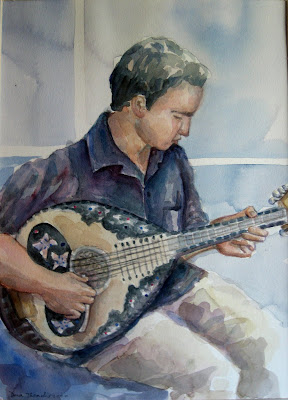 |
John’s Laouto 11×14 Watercolor
©2001 Dora Sislian Themelis |
As I have said in past posts, I was primarily an oil painter. I think I used watercolors the way they should be used in this work I painted quite a few years ago. This was done after the miserable watercolor class I took. Can you see the difference?
The other thing about these two paintings is that the bagpipe was painted using a photograph of the scene and this was painted from life in one sitting. I think the life painting has a freer, more spontaneous watery quality. When I started using watercolors, I had just ended a bout with resistance. Since I was new at it, I had motivation in my corner and kept painting.
The bagpipe work is dramatic because of the lighting and paint application, but maybe a bit too detailed for my comfort.
As I move on it may be time to get the oil paints out and revisit painting on canvas. I’ve been using watercolors as if they were oil paints by applying them the same as I would the oils. Maybe it’s not a great idea. Maybe it’s just how I work. I’m not so sure.
Watercolor paints are just so easy to get out, use and clean up afterward that they’re very inviting. The transparency of the medium is what artists like, but did I work with them the way they’re meant to be? Does it matter? Comments, questions, criticisms?
Anyway, that’s my own critique. Thanks for listening to me rant. I’m done and I’m moving on.

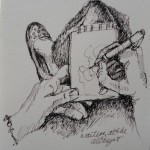
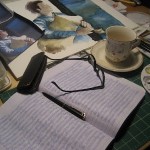
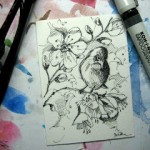
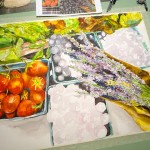
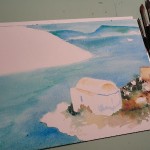
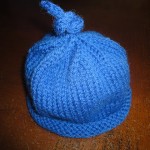
Great job on both of the paintings. Watercolours aren’t easy at first and especially for difficult subjects such as people. Well done. I agree that a heavier paper would make the whole process so much easier. I use 300 pound cold press paper and it really helps. It’s hard to explain how much difference a paper can make but it can truly be a huge factor in the success of the painting. The cold press paper has a rough texture which gives the painting a “tooth” for the paint to grab onto which is great for drybrushing texture such as ice, bark, pebbles, a roof, etc. The weight of the paper makes it lesz susceptible to curling and puddling. It also makes the paper more forgiving which means you won’t be as likely to rub off the surface fibres of the paper as you apply multiple brushstrokes in one area. It’s also important to note that the brand of paper you are using can also a big difference which in my opinion can be night and day. I love Arches paper. The colours seem to blend a lot smoother. It has just the right amount of sizing which is applied to these cotton papers so that they won’t absorb the water too quickly. I guess it kind of protects the paper from getting waterlogged in a way. I have used other papers which have been nearly impossible to paint a smooth clean wash on without getting streaks or runbacks, cauliflower like stains in the painting. As far as painting styles you will develop your own as your familiarity with the medium increases. When you said you painted these like an oil painter would I thought they would be lacking highlights (since you can’t paint light over dark in watercolour) but you did a great job of saving your light areas. The highlights in your bagpipes and on your son’s face really work in the painting. Watercolour can be frustrating for sure, but I hope you will grow to love the medium. When you lay down the perfect wash it will make your heart sing. 🙂
painting really came out beautiful. dont touch it!
Sincerely,
Blue Shoes Manhattan
It is a beautiful painting – there is a great feeling of light and dark in it.
Yes, the older one is more “washy” if that’s a word 🙂
But, I have seen watercolour used with more water than colour and I have seen watercolour used to produce near photographic representation.
Versatility I think is what most watercolourists love – and as you’ve proved with two different styles, it is versatile – as are you. You did a great job.
If its any help, I’ve read The Artists Way also – and I don’t use any of it now. I struggled more with it.
I prefer Yoda’s philosophy.. “do not try! Either do, or do not do”
Not so much thinking and a lot more fun 🙂
Versatility is a good thing and I like the bright light and the black darks too…good for you! I’ve done a little work with watercolors and so its interesting to hear how paper makes such a difference. With this,as with any technique, you are only limited by your imagination.
I think they’re BOTH amazing. Watercolors are such a challenge! And these are just lovely 🙂 Nice work.
Thank you all for the wonderful and helpful comments, critiques, and suggestions! I’m definately going to try new paper and keep going!
Dora, I just saw these two paintings. I must say, the are beautiful! I keep learning of how great an artist you are with each painting I study. I understand what you said in one blog about using the basics included in your started kit of watercolors. You can see in your Greek Island watercolor, why you feel that way. The blue is so vivid. Your basic primary colors aren’t muddied. I love doing watercolor painting. Much more than using oils–possibly because I’m so impatient. The only acrylics I’ve used were to paint a mural on my granddaughter’s bedroom wall. So I’m not very familiar with acrylics vs oils. Anyway, watercolors are for the free-spirited! You certainly seem to be!
Therese, thanks for your thoughts. I never thought of myself as a free spirit, but maybe a bohemian artist whacko, LOL! Like a broody oil painter, get in paint-get out,done. Watercolors need patience and it seems I’m not patient, but I thought I was. Well, maybe I am in some areas. I guess I’ll figure it out when I ‘grow up.’
Nice blog, well done. Love it ! Two thoughts. On the bag pipes for what ever reason you seamed to have taken more chances with the bold color choices with deep blacks, & yet seams more layered. On the Balalaika ( a feat unto it self ) possibly as it was a photo, you felt that you had all day to complete this. It is looser on as a whole.
Interesting where you start to admit that painting becomes a job the minute that you announce it. Such is life & the Irony. Yet it is trying to maintain that balance, that is key. God Bless in all of your works!!
Well, Fly on the Wall, the second painting in the post was painted from life, the first was from a photo. I have found that there’s no way I can paint on anything all day either. That practice has dire consequences for me and my work! It could all turn into mud quite quickly and, on many occasions, has happened. I get to a certain point, and then I just gotta stop!
Thanks so much for posting a comment here. It is very much appreciated.